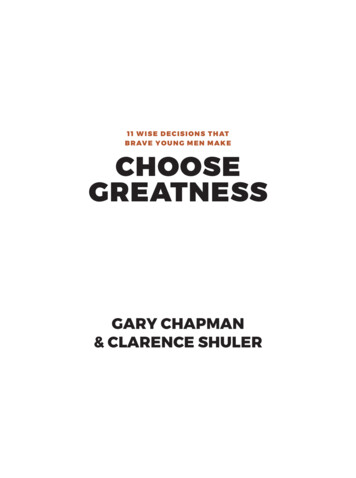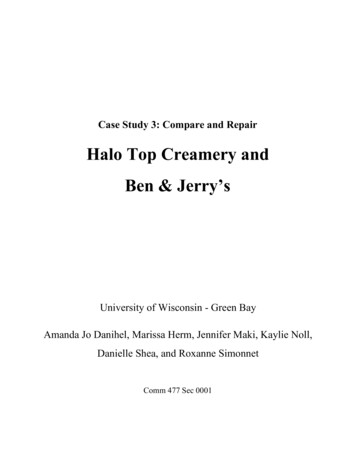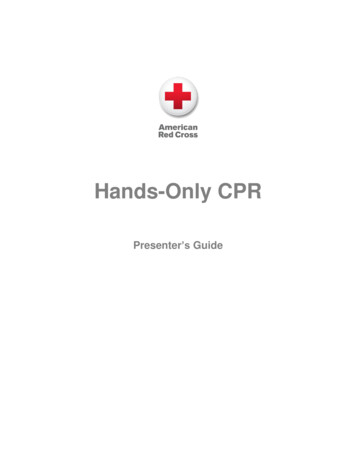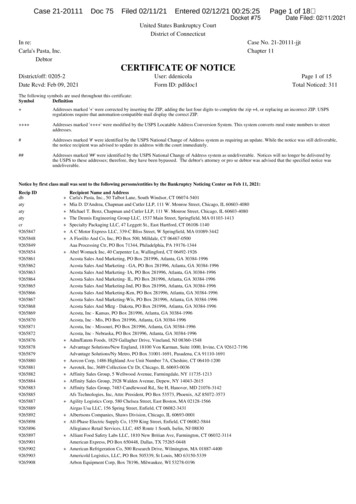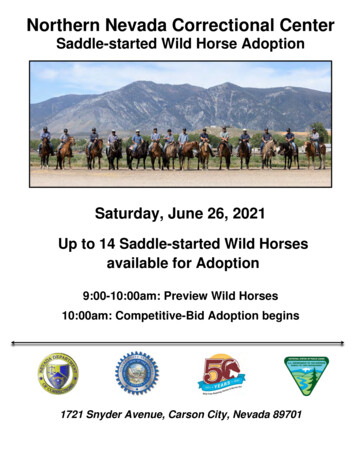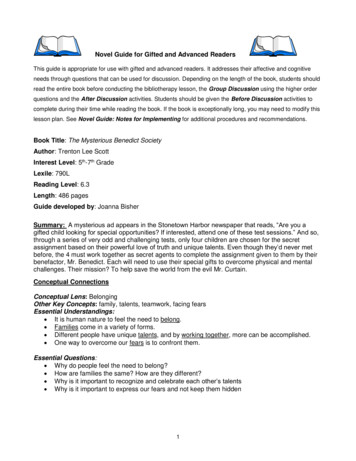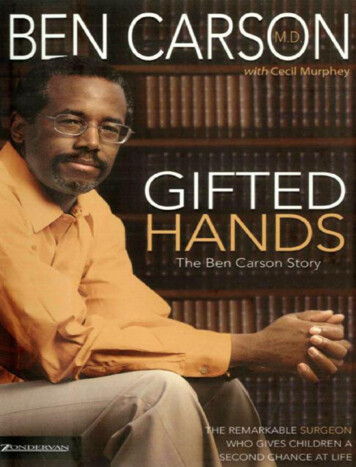
Transcription
Also by Ben CarsonThink BigThe Big Picture
We want to hear from y ou. Please send y our comments about thisbook to us in care of zrev iew@zonderv an.com. Thank y ou.Gifted HandsePub FormatCopy right 1990 by Rev iew and Herald Publishing AssociationThis title is also av ailable as a Zonderv an audio product.Visit www.zonderv an.com/audiopages for more information.Requests for information should be addressed to:Zonderv an, Grand Rapids, Michigan 49530ISBN: 0-310-29555-6All Scripture quotations, unless otherwise indicated, are tak en from theHoly Bible, New International Version . NIV . Copy right 1973, 1978,1984 by International Bible Society . Used by permission of Zonderv an. Allrights reserv ed.All rights reserv ed. No part of this publication may be reproduced, storedin a retriev al sy stem, or transmitted in any form or by any means—electronic, mechanical, photocopy , recording, or any other—except forbrief quotations in printed rev iews, without the prior permission of thepublisher.
Cov er photo by Christine ArmstrongThis edition is published by arrangement with Rev iew and Herald Publishing Association and Zonderv an.Interior design by Beth Shagene
This bookis dedicated to my mother,SONYA CARSON,who basically sacrificed her lifeto make certain that my brother and Igot a head start.
ContentsTitle PageCopyright PageIntroduction1. “Goodbye, Daddy”2. Carrying the Load3. Eight Years Old4. Two Positives5. A Boy's Big Problem6. A Terrible Temper7. ROTC Triumph8. College Choices9. Changing the Rules10. A Serious Step11. Another Step Forward12. Coming Into My Own13. A Special Year14. A Girl Named Maranda15. Heartbreak
16. Little Beth17. Three Special Children18. Craig and Susan19. Separating the Twins20. The Rest of Their Story21. Family Affairs22. Think Big
Introductionby Candy CarsonMore blood! Stat!”The silence of the OR was smashed by the amazinglyquiet command. The twins had received 50 units of blood,but their bleeding still hadn't stopped!“There's no more type-specific blood,” the reply came.“We've used it all.”As a result of this announcement, a quiet panic eruptedthrough the room. Every ounce of type AB* negative bloodhad been drained from the Johns Hopkins Hospital bloodbank. Yet the 7-month-old twin patients who had beenjoined at the back of their heads since birth needed moreblood or they would die without ever having a chance torecuperate. This was their only opportunity, their onlychance, at normal lives.Their mother, Theresa Binder, had searchedthroughout the medical world and found only one teamwho was willing to even attempt to separate her twin boysand preserve both lives. Other surgeons told her it couldn'tbe done—that one of the boys would have to be sacrificed.Allow one of her darlings to die? Theresa couldn't even
bear the thought. Although they were joined at the head,even at 7 months of age each had his own personality—one playing while the other slept or ate. No, she absolutelycouldn't do it! After months of searching she discoveredthe Johns Hopkins team.Many of the 70-member team began offering to donatetheir own blood, realizing the urgency of the situation.The 17 hours of laborious, tedious, painstakingoperating on such tiny patients had progressed well, allthings considered. The babies had been successfullyanesthetized after only a few hours, a complex procedurebecause of their shared blood vessels. The preparation forcardiovascular bypass hadn't taken much longer thanexpected (the five months of planning and numerous dressrehearsals had paid off). Getting to the site of the twins'juncture wasn't particularly difficult for the young, thoughseasoned, neurosurgeons either. But, as a result of thecardiovascular bypass procedures, the blood lost itsclotting properties. Therefore, every place in the infants'heads that could bleed did bleed!Fortunately, within a short time the city blood bank wasable to locate the exact number of units of blood neededto continue the surgery. Using every skill, trick, and deviceknown in their specialities, the surgeons were able to stopthe bleeding within a couple of hours. The operationcontinued. Finally, the plastic surgeons sewed the last skinflaps to close the wounds, and the 22-hour surgical ordeal
was over. The Siamese twins—Patrick and Benjamin—were separate for the first time in their lives!The exhausted primary neurosurgeon who had devisedthe plan for the operation was a ghetto kid from thestreets of Detroit.
CHAPTER 1“Goodbye, Daddy”And your daddy isn't going to live with us anymore.”“Why not?” I asked again, choking back the tears. I justcould not accept the strange finality of my mother's words.“I love my dad!”“He loves you too, Bennie but he has to go away. Forgood.”“But why? I don't want him to go. I want him to stayhere with us.”“He's got to go—”“Did I do something to make him want to leave us?”“Oh, no, Bennie. Absolutely not. Your daddy loves you.”I burst into tears. “Then make him come back.”“I can't. I just can't.” Her strong arms held me close,trying to comfort me, to help me stop crying. Gradually mysobs died away, and I calmed down. But as soon as sheloosened her hug and let me go, my questions startedagain.“Your Daddy did—” Mother paused, and, young as Iwas, I knew she was trying to find the right words to make
me understand what I didn't want to grasp. “Bennie, yourdaddy did some bad things. Real bad things.”I swiped my hand across my eyes. “You can forgive himthen. Don't let him go.”“It's more than just forgiving him, Bennie—”“But I want him to stay here with Curtis and me andyou.”Once again Mother tried to make me understand whyDaddy was leaving, but her explanation didn't make a lotof sense to me at 8 years of age. Looking back, I don'tknow how much of the reason for my father's leaving sankinto my understanding. Even what I grasped, I wanted toreject. My heart was broken because Mother said that myfather was never coming home again. And I loved him.Dad was affectionate. He was often away, but when hewas home he'd hold me on his lap, happy to play with mewhenever I wanted him to. He had great patience withme. I particularly liked to play with the veins on the back ofhis large hands, because they were so big. I'd push themdown and watch them pop back up. “Look! They're backagain!” I'd laugh, trying everything within the power of mysmall hands to make his veins stay down. Dad would sitquietly, letting me play as long as I wanted.Sometimes he'd say, “Guess you're just not strongenough,” and I'd push even harder. Of course nothingworked, and I'd soon lose interest and play with somethingelse.
Even though Mother said that Daddy had done somebad things, I couldn't think of my father as “bad,” becausehe'd always been good to my brother, Curtis, and me.Sometimes Dad brought us presents for no special reason.“Thought you'd like this,” he'd say offhandedly, a twinkle inhis dark eyes.Many afternoons I'd pester my mother or watch theclock until I knew it was time for my dad to come homefrom work. Then I'd rush outside to wait for him. I'd watchuntil I saw him walking down our alley. “Daddy! Daddy!” I'dyell, running to meet him. He would scoop me into hisarms and carry me into the house.That stopped in 1959 when I was 8 years old andDaddy left home for good. To my young, hurting heart thefuture stretched out forever. I couldn't imagine a lifewithout Daddy and didn't know if Curtis, my 10-year-oldbrother, or I would ever see him again.Idon't know how long I continued the crying andquestioning the day Daddy left; I only know it was thesaddest day of my life. And my questions didn't stop withmy tears. For weeks I pounded my mother with everypossible argument my mind could conceive, trying to findsome way to get her to make Daddy come back home.“How can we get by without Daddy?”
“Why don't you want him to stay?”“He'll be good. I know he will. Ask Daddy. He won't dobad things again.”My pleading didn't make any difference. My parents hadsettled everything before they told Curtis and me.“Mothers and fathers are supposed to stay together,” Ipersisted. “They're both supposed to be with their littleboys.”“Yes, Bennie, but sometimes it just doesn't work outright.”“I still don't see why,” I said. I thought of all the thingsDad did with us. For instance, on most Sundays, Dadwould take Curtis and me for drives in the car. Usually wevisited people, and we'd often stop by to see one family inparticular. Daddy would talk with the grown-ups, while mybrother and I played with the children. Only later did welearn the truth—my father had another “wife” and otherchildren that we knew nothing about.I don't know how my mother found out about his doublelife, for she never burdened Curtis and me with theproblem. In fact, now that I'm an adult, my one complaintis that she went out of her way to protect us from knowinghow bad things were. We were never allowed to sharehow deeply she hurt. But then, that was Mother's way ofprotecting us, thinking she was doing the right thing. Andmany years later I finally understood what she called his“betrayals with women and drugs.”
Long before Mother knew about the other family, Isensed things weren't right between my parents. Myparents didn't argue; instead, my father just walked away.He had been leaving the house more and more andstaying away longer and longer. I never knew why.Yet when Mother told me “Your daddy isn't comingback,” those words broke my heart.I didn't tell Mother, but every night when I went to bed Iprayed, “Dear Lord, help Mother and Dad get backtogether again.” In my heart I just knew God would helpthem make up so we could be a happy family. I didn'twant them to be apart, and I couldn't imagine facing thefuture without my father.But Dad never came home again.As the days and weeks passed, I learned we could getby without him. We were poorer then, and I could tellMother worried, although she didn't say much to Curtis orme. As I grew wiser, and certainly by the time I was 11, Irealized that the three of us were actually happier than wehad been with Dad in the house. We had peace. Noperiods of deathly silence filled the house. I no longerfroze with fear or huddled in my room, wondering whatwas happening when Mother and Daddy didn't talk.That's when I stopped praying for them to get backtogether. “It's better for them to stay split up,” I said toCurtis. “Isn't it?”“Yeah, guess so,” he answered. And, like Mother, he
didn't say much to me about his own feelings. But I think Iknew that he too reluctantly realized that our situation wasbetter without our father.Trying to remember how I felt in those days after Dadleft, I'm not aware of going through stages of anger andresentment. My mother says that the experience pushedCurtis and me into a lot of pain. I don't doubt that hisleaving meant a terrible adjustment for both of us boys.Yet I still have no recollection beyond his initial leaving.Maybe that's how I learned to handle my deep hurt—byforgetting.We just don't have the money, Bennie.”In the months after Dad left, Curtis and I must haveheard that statement a hundred times, and, of course, itwas true. When we asked for toys or candy, as we'd donebefore, I soon learned to tell from the expression onMother's face how deeply it hurt her to deny us. After awhile I stopped asking for what I knew we couldn't haveanyway.In a few instances resentment flashed across mymother's face. Then she'd get very calm and explain to usboys that Dad loved us but wouldn't give her any money tosupport us. I vaguely recall a few times when Mother wentto court, trying to get child support from him. Afterward,
Dad would send money for a month or two—never the fullamount—and he always had a legitimate excuse. “I can'tgive you all of it this time,” he'd say, “but I'll catch up. Ipromise.”Dad never caught up. After a while Mother gave uptrying to get any financial help from him.I was aware that he wouldn't give her money, whichmade life harder on us. And in my childish love for a dadwho had been kind and affectionate, I didn't hold it againsthim. But at the same time I couldn't understand how hecould love us and not want to give us money for food.One reason I didn't hold any grudges or harsh feelingstoward Dad must have been that my mother seldomblamed him—at least not to us or in our hearing. I canhardly think of a time when she spoke against him.More important than that fact, though, Mother managedto bring a sense of security to our three-member family.While I still missed Dad for a long time, I felt a sense ofcontentment being with just my mother and my brotherbecause we really did have a happy family.My mother, a young woman with hardly any education,came from a large family and had many things againsther. Yet she pulled off a miracle in her own life, andhelped in ours. I can still hear Mother's voice, no matterhow bad things were, saying, “Bennie, we're going to befine.” Those weren't empty words either, for she believedthem. And because she believed them, Curtis and I
believed them too, and they provided a comfortingassurance for me.Part of Mother's strength came from a deep-seatedfaith in God and perhaps just as much from her innateability to inspire Curtis and me to know she meant everyword she said. We knew we weren't rich; yet no matterhow bad things got for us, we didn't worry about whatwe'd have to eat or where we'd live.Our growing up without a father put a heavy burden onmy mother. She didn't complain—at least not to us—andshe didn't feel sorry for herself. She tried to carry thewhole load, and somehow I understood what she wasdoing. No matter how many hours she had to be awayfrom us at work, I knew she was doing it for us. Thatdedication and sacrifice made a profound impression onmy life.Abraham Lincoln once said, “All that I am or ever hopeto be, I owe to my mother.” I'm not sure I want to say itquite like that, but my mother, Sonya Carson, was theearliest, strongest, and most impacting force in my life.It would be impossible to tell about myaccomplishments without starting with my mother'sinfluence. For me to tell my story means beginning withhers.
CHAPTER 2Carrying the LoadThey're not going to treat my boy that way,” Mother saidas she stared at the paper Curtis had given her. “No, sir,they're not going to do that to you.” Curtis had had to readsome of the words to her, but she understood exactlywhat the school counselor had done.“What you going to do, Mother?” I asked in surprise. Ithad never occurred to me that anyone could changeanything when school authorities made decisions.“I'm going right over there in the morning and get thisstraightened out,” she said. From the tone of her voice Iknew she'd do it.Curtis, two years my senior, was in junior high schoolwhen the school counselor decided to place him into thevocational-type curriculum. His once-low grades had beenclimbing nicely for more than a year, but he was enrolledin a predominantly White school, and Mother had no doubtthat the counselor was operating from the stereotypicalthinking that Blacks were incapable of college work.Of course, I wasn't at their meeting, but I still vividlyremember what Mother told us that evening. “I said to thatcounselor woman, ‘My son Curtis is going to college. Idon't want him in any vocational courses.’” Then she put
her hand on my brother's head. “Curtis, you are now inthe college prep courses.”That story illustrates my mother's character. She wasnot a person who would allow the system to dictate herlife. Mother had a clear understanding of how things wouldbe for us boys.My mother is an attractive woman, five feet three andslim, although when we were kids I'd say she was on theplump side of medium. Today she suffers from arthritisand heart problems, but I don't think she has slowed downmuch.Sonya Carson has the classic Type A personality—hardworking, goal-oriented, driven to demanding the bestof herself in any situation, refusing to settle for less. She'shighly intelligent, a woman who quickly grasps the overallsignificance rather than searching for details. She has anatural ability—an intuitive sense—that enables her toperceive what should be done. That's probably her mostoutstanding characteristic.Because of that determined, perhaps compulsive,personality that demanded so much from herself, sheinfused some of that spirit into me. I don't want to portraymy mother as perfect because she was human too. Attimes her refusing to allow me to settle for less than thebest came across as nagging, demanding, even heartlessto me. When she believed in something she held on andwouldn't quit. I didn't always like hearing her say, “You
weren't born to be a failure, Bennie. You can do it!” Or oneof her favorites: “You just ask the Lord, and He'll helpyou.”Being kids, we didn't always welcome her lessons andadvice. Resentment and obstinance crept in, but mymother refused to give up.Over a period of years, with Mother's constantencouragement, both Curtis and I started believing that wereally could do anything we chose to do. Maybe shebrainwashed us into believing that we were going to beextremely good and highly successful at whatever weattempted. Even today I can clearly hear her voice in theback of my head saying, “Bennie, you can do it. Don't youstop believing that for one second.”Mother had only a third-grade education when shemarried, yet she provided the driving force in our home.She pushed my laid-back father to do a lot of things.Largely because of her sense of frugality, they saved a fairamount of money and eventually bought our first house. Isuspect that, had things gone Mother's way, ultimatelythey would have been financially well-off. And I'm sure shehad no premonition of the poverty and hardship she'd haveto face in the years ahead.By contrast, my father was six feet two, slender, and heoften said, “You got to look sharp all the time, Bennie.Dress the way you want to be.” He emphasized clothesand possessions, and he enjoyed being around people.
“Be nice to people. People are important, and if you'renice to them, they'll like you.” Recalling those words, Ibelieve he put great importance on being liked byeverybody. If anyone asked me to describe my dad, I'dhave to say, “He's just a nice guy.” And, despite all theproblems that erupted later, I feel that way today.My father was the kind of person who would havewanted us to wear the fancy clothes and to do the machokind of things like girl hunting—the lifestyle that wouldhave been detrimental to establishing ourselvesacademically. In many ways, I'm now grateful my mothertook us out of that environment.Intellectually, Dad didn't easily grasp complex problemsbecause he tended to get bogged down in details, unableto see the overall picture. That was probably the biggestdifference between my parents.Both parents came from big families: my mother had23 siblings, and my father grew up with 13 brothers andsisters. They married when my father was 28 and mymother was 13. Many years later she confided that shewas looking for a way to get out of a desperate homesituation.Shortly after their marriage, they moved fromChattanooga, Tennessee, to Detroit, which was the trendfor laborers in the late 1940s and early 1950s. Peoplefrom the rural South migrated toward what theyconsidered lucrative factory jobs in the North. My father
got a job at the Cadillac plant. So far as I know, it was thefirst and only employment he ever held. He worked forCadillac until he retired in the late 1970s.My father also served as a minister in a small Baptistchurch. I've never been able to understand whether hewas an ordained minister or not. Only one time did Daddytake me to hear him preach—or at least I remember onlyone occasion. Daddy wasn't one of those fiery types likesome television evangelists. He spoke rather calmly, raisedhis voice a few times, but he preached in a relatively lowkey, and the audience didn't get stirred up. He didn't havea real flow of words, but he did the best he could. I canstill see him on that special Sunday as he stood in front ofus, tall and handsome, the sun glinting off a large metalcross that dangled across his chest.I'mgoing away for a few days,” Mother said severalmonths after Daddy left us. “Going to see some relatives.”“We going too?” I asked with interest.“No, I have to go alone.” Her voice was unusually quiet.“Besides, you boys can't miss school.”Before I could object, she told me that we could staywith neighbors. “I've already arranged it for you. You cansleep over there and eat with them until I come back.”Maybe I should have wondered why she left, but I
didn't. I was so excited to stay in somebody else's housebecause that meant extra privileges, better food, and a lotof fun playing with the neighbor kids.That's the way it happened the first time and severaltimes after that. Mother explained that she was goingaway for a few days, and we would be taken care of byour neighbors. Because she carefully arranged for us tostay with friends, it was exciting rather than frightful.Secure in her love, it never occurred to me that shewouldn't be back.It may seem strange, but it is a testimony to thesecurity we felt in our home—I was an adult before Idiscovered where Mother went when she “visitedrelatives.” When the load became too heavy, she checkedherself into a mental institution. The separation anddivorce plunged her into a terrible period of confusion anddepression, and I think her inner strength helped herrealize she needed professional help and gave her thecourage to get it. Usually she was gone for several weeksat a time.We boys never had the slightest suspicion about herpsychiatric treatment. She wanted it that way.With time, Mother rebounded from her mentalpressures, but friends and neighbors found it hard toaccept her as healthy. We kids never knew it, for Mothernever let on how it hurt her, but her treatment in a mentalhospital provided neighbors with a hot topic of gossip,
perhaps even more because she had gone through adivorce. Both problems created serious stigmas at thetime. Mother not only had to cope with providing a homeand making a living to support us, but most of her friendsdisappeared when she needed them most.Because Mother never talked to anyone about thedetails of her divorce, people assumed the worst andcirculated wild stories about her.“I just decided that I had to go about my ownbusiness,” Mother once told me, “and ignore what peoplesaid.” She did, but it couldn't have been easy. It hurts tothink of how many lonely, tearful times she suffered alone.Finally, with no financial resources to fall back on,Mother knew she couldn't keep up the expenses of living inour house, modest as it was. The house was hers, as partof the divorce settlement. So after several months oftrying to make it on her own, Mother rented out the house,packed us up, and we moved away. This was one of thetimes when Dad reappeared, for he came back to drive usto Boston. Mother's older sister, Jean Avery, and herhusband, William, agreed to take us in.We moved into the Boston tenements with the Averys.Their children were grown, and they had a lot of love toshare with two little boys. In time, they became likeanother set of parents to Curtis and me, and that waswonderful for we needed a lot of affection and sympathythen.
For a year or so after we moved to Boston, Mother stillunderwent psychiatric treatment. Her trips away lastedthree or four weeks each time. We missed her, but wereceived such special attention from Uncle William andAunt Jean when she was gone that we liked the occasionalarrangement.The Averys assured Curtis and me, “Your mama isdoing just fine.” After getting a letter or a telephone callthey'd tell us, “She'll be back in a few more days.” Theyhandled the situation so well that we never had any ideahow tough things were for our mother. And that's just howthe strong-willed Sonya Carson wanted it to be.
CHAPTER 3Eight Years OldRats!” I yelled. “Hey, Curt, lookey there! I sawrats!” Ipointed in horror to a large weeded area behind ourtenement building. “And they're bigger than cats!”“Not quite that big,” Curtis countered, trying to soundmore mature. “But they sure are mean-looking.”Nothing in Detroit had prepared us for life in a Bostontenement. Armies of roaches streaked across the room,impossible to get rid of no matter what Mother did. Morefrightening to me were the hordes of rats, even thoughthey never got close. Mostly they lived outside in theweeds or piles of debris. But occasionally they scurriedinto the basement of our building, especially during thecold weather.“I'm not going down there by myself,” I said adamantlymore than once. I was scared to go down into thebasement alone. And I wouldn't budge unless Curtis orUncle William went with me.Sometimes snakes came out of the weeds to slitherdown the sidewalks. Once a big snake crawled into ourbasement, and someone killed it. For days afterward all uskids talked about snakes.“You know, a snake got into one of those buildings
behind us last year and killed four children in their sleep,”one of my classmates said.“They gobble you up,” insisted another.“No, they don't,” the first one said and laughed. “Theykind of sting you and then you die.” Then he told anotherstory about somebody being killed by a snake.The stories weren't true, of course, but hearing themoften enough kept them in my mind, making me cautious,fearful, and always on the lookout for snakes.A lot of winos and drunks flopped around the area, andwe became so used to seeing broken glass, trashed lots,dilapidated buildings, and squad cars racing up the streetthat we soon adjusted to our change of lifestyle. Withinweeks this setting seemed perfectly normal andreasonable.No one ever said, “This isn't the way normal peoplelive.” Again, I think it was the sense of family unity,strengthened by the Averys, that kept me from being tooconcerned about the quality of our life in Boston.Of course, Mother worked. Constantly. She seldom hadmuch free time, but she showered that time on Curtis andme, which made up for the hours she was away. Motherstarted working in homes of wealthy people, caring fortheir children or doing domestic work.“You look tired,” I said one evening when she walkedinto our narrow apartment. It was already dark, and she'dput in a long day working two jobs, neither of them well-
paying.She leaned back in the overstuffed chair. “Guess I am,”she said as she kicked off her shoes. Her smile caressedme. “What did you learn in school today?” she asked.No matter how tired she was, if we were still up whenshe got home, Mother didn't fail to ask about school. Asmuch as anything, her concern for our education began toimpress on me that she considered school important.I was still 8 years old when we moved to Boston, asometimes serious-minded child who occasionallypondered all the changes that had come into my life. Oneday I said to myself, “Being 8 is fantastic because whenyou're 8 you don't have any responsibilities. Everybodytakes care of you, and you can just play and have fun.”But I also said, “It's not always going to be this way. SoI'm going to enjoy life now.”With the exception of the divorce, the best part of mychildhood happened when I was 8 years old. First, I hadthe most spectacular Christmas of my life. Curtis and I hada wonderful time Christmas shopping, then our aunt anduncle swamped us with toys. Mother too, trying to makeup for the loss of our father, bought us more than sheever had before.One of my favorite gifts was a scale model 1959 Buickwith friction wheels. But the chemistry set topped even thetoy Buick. Never, before or since, did I have a toy that heldmy interest like the chemistry set. I spent hours in the
bedroom playing with the set, studying the directions, andworking one experiment after another. I turned litmuspaper blue and red. I mixed chemicals into strangeconcoctions and watched in fascination when they fizzled,foamed, or turned different colors. When something I'dcreated filled the whole apartment with the smell of rotteneggs or worse, I'd laugh until my sides ached.Second, I had my first religious experience when I was8 years old. We were Seventh-day Adventists, and oneSaturday morning Pastor Ford, at the Detroit Burns Avenuechurch, illustrated his sermon with a story.A natural storyteller, Pastor Ford told of a missionarydoctor husband and wife who were being chased byrobbers in a far-off country. They dodged around treesand rocks, always managing to keep just ahead of thebandits. At last, gasping with exhaustion, the couplestopped short at a precipice. They were trapped.Suddenly, right at the edge of the cliff, they saw a smallbreak in the rock—a split just big enough for them to crawlinto and hide. Seconds later, when the men reached theedge of the escarpment, they couldn't find the doctor andhis wife. To their unbelieving eyes, the couple had justvanished. After screaming and cursing them, the banditsleft.As I listened, the picture became so vivid that I felt as ifI were being chased. The pastor wasn't overly dramatic,but I got caught up in an emotional experience, living their
plight as if the wicked men were trying to capture me. Ivisualized myself being pursued. My breath becameshallow with the panic and fear and desperation of thatcouple. At last when the bandits left, I sighed with relief atbeing safe.Pastor Ford looked out over the congregation. “Thecouple were sheltered and protected,” he told us. “Theywere hidden in the cleft of the rock, and God protectedthem from harm.”The sermon over, we began to sing the “appeal song.”That morning the pastor had selected “He Hideth My Soulin the Cleft of the Rock.” He built his appeal around themissionary story and explained our need to flee to “thecleft of the rock,” to safety found only in Jesus Christ.“If we place our faith in the Lord,” he said as his gazeswept a
by Candy Carson More blood! Stat!” The silence of the OR was smashed by the amazingly quiet command. The twins had received 50 units of blood, but their bleeding still hadn't stopped! “There's no more type-specific blood,” the reply came. “We've used it all.” As a result of this announcement, a quiet panic erupted through the room.
